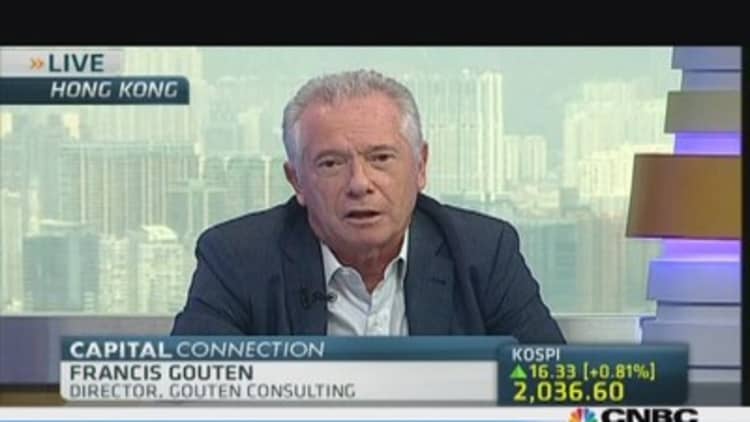China's shoppers may be gearing up for the Lunar New Year gift-giving season, but that may not benefit the mainland's luxury players much, Goldman Sachs said.
The reason? The mainland's anti-corruption efforts are likely to intensify, not just plateau, Goldman said in a note.
"Recent policy comments suggest an intensification of efforts, particularly in terms of stricter supervision and firmer punishments," it said. The anti-corruption language in the Third Plenum is firmer and more comprehensive than previous comments from President Xi Jinping and the recently released anti-corruption five-year plan adds more reform focus areas, including supervision and enforcement, it said.
(Read more: Logo fatigue? Chinese now want understated luxury)

"Many high-end segments ranging from Macau VIP to large restaurants/catering businesses and luxury watches have suffered meaningful lower volume trends," Goldman said. "The risk is to the downside and further demand deterioration year-on-year is quite possible."
In addition, China may expand its consumption tax list for luxury items, such as handbags, to include items such as yachts, while trials of introducing property taxes may advance and firmer asset-disclosure requirements may be imposed, all of which are unfavorable for high-end demand, Goldman said.
It advises avoiding businesses linked to extravagance, such as high-end catering and hotels, hard luxury and property, including luxury auto dealers, high-end retail brands and department stores, Macau VIP gaming and some spirits makers.
(Read more: Top 2% of Chinese account for third of global luxury sales)
Goldman also suggests staying away from companies that rely heavily on local relationships rather than strong core businesses, such as equipment or drug makers which don't have differentiated products.
Others also see some reasons for concern for the sector, but they aren't quite as negative.
"The impact of the government's anti-corruption measures in 2013 has been longer and bigger in scope than expected," Deutsche Bank said. But it added that it views the development as healthy

(Read more: Super-luxury car sales dropped in 2013)
"High-end spending should be supported by the development of middle income class for the future (instead of the culture of 'gifting')," it said, citing Bain & Co. data projecting China's luxury market will grow around the same pace as 2013's estimated 2 percent, down from 7 percent in 2012.
"Chinese consumers (ex-gifting) continue to shop," Deutsche Bank said, adding they are just becoming more subtle, taking steps such as buying handbags without logos.
In addition, global luxury names may not feel as much of a pinch as Chinese are likely to continue shopping while traveling outside Hong Kong and China, Goldman said.
(Read more: China's corruption crackdown targets the holiday mooncake)
But even there, some see reasons for concern.
"Overseas purchases by Chinese nationals remain relatively robust," Nomura said in a note. But it sees some risks for the global players.
"Given the speed at which luxury goods companies targeted the Chinese (both domestically and in-transit), there has been an element of brand fatigue. The Chinese consumer is evolving at a rate that is faster than brands have experienced before," it said.
— By CNBC's Leslie Shaffer. Follow her on Twitter: @LeslieShaffer1

